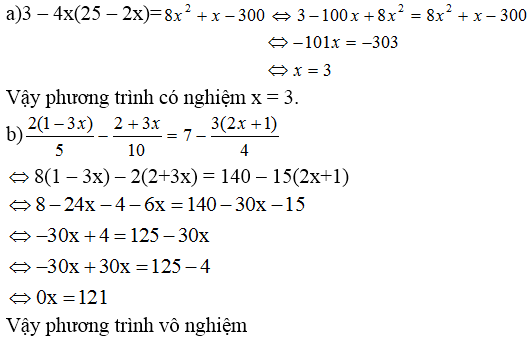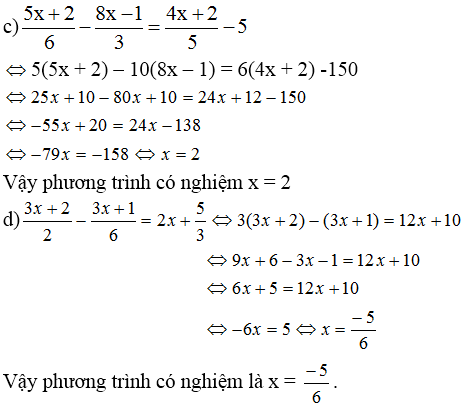Hãy nhập câu hỏi của bạn vào đây, nếu là tài khoản VIP, bạn sẽ được ưu tiên trả lời.

giải pt sau
g) 11+8x-3=5x-3+x
\(\Leftrightarrow\) 8x + 8 = 6x - 3
<=> 8x-6x = -3 - 8
<=> 2x = -11
=> x=-\(\dfrac{11}{2}\)
Vậy tập nghiệm của PT là : S={\(-\dfrac{11}{2}\)}
h)4-2x+15=9x+4-2x
<=> 19 - 2x = 7x + 4
<=> -2x - 7x = 4 - 19
<=> -9x = -15
=> x=\(\dfrac{15}{9}=\dfrac{5}{3}\)
Vậy tập nghiệm của pt là : S={\(\dfrac{5}{3}\)}
g)\(\dfrac{3x+2}{2}-\dfrac{3x+1}{6}=\dfrac{5}{3}+2x\)
<=> \(\dfrac{3\left(3x+2\right)}{6}-\dfrac{3x+1}{6}=\dfrac{5.2+6.2x}{6}\)
<=> 9x + 6 - 3x + 1 = 10 + 12x
<=> 6x + 7 = 10 + 12x
<=> 6x -12x = 10-7
<=> -6x = 3
=> x= \(-\dfrac{1}{2}\)
Vậy tập nghiệm của PT là : S={\(-\dfrac{1}{2}\)}
\(h,\dfrac{x+4}{5}-x+4=\dfrac{4x+2}{5}-5\)
<=> \(\dfrac{x+4-5\left(x+4\right)}{5}=\dfrac{4x+2-5.5}{5}\)
<=> x + 4 - 5x - 20 = 4x + 2 - 25
<=> x - 5x - 4x = 2-25-4+20
<=> -8x = -7
=> x= \(\dfrac{7}{8}\)
Vậy tập nghiệm của PT là S={\(\dfrac{7}{8}\)}
\(i,\dfrac{4x+3}{5}-\dfrac{6x-2}{7}=\dfrac{5x+4}{3}+3\)
<=> \(\dfrac{21\left(4x+3\right)}{105}\)-\(\dfrac{15\left(6x-2\right)}{105}\)=\(\dfrac{35\left(5x+4\right)+3.105}{105}\)
<=> 84x + 63 - 90x + 30 = 175x + 140 + 315
<=> 84x - 90x - 175x = 140 + 315 - 63 - 30
<=> -181x = 362
=> x = -2
Vậy tập nghiệm của PT là : S={-2}
K) \(\dfrac{5x+2}{6}-\dfrac{8x-1}{3}=\dfrac{4x+2}{5}-5\)
<=> \(\dfrac{5\left(5x+2\right)}{30}-\dfrac{10\left(8x-1\right)}{30}=\dfrac{6\left(4x+2\right)-150}{30}\)
<=> 25x + 10 - 80x - 10 = 24x + 12 - 150
<=> -55x = 24x - 138
<=> -55x - 24x = -138
=> -79x = -138
=> x=\(\dfrac{138}{79}\)
Vậy tập nghiệm của PT là S={\(\dfrac{138}{79}\)}
m) \(\dfrac{2x-1}{5}-\dfrac{x-2}{3}=\dfrac{x+7}{15}\)
<=> \(\dfrac{3\left(2x-1\right)-5\left(x-2\right)}{15}=\dfrac{x+7}{15}\)
<=> 6x - 3 - 5x + 10 = x+7
<=> x + 7 = x+7
<=> 0x = 0
=> PT vô nghiệm
Vậy S=\(\varnothing\)
n)\(\dfrac{1}{4}\left(x+3\right)=3-\dfrac{1}{2}\left(x+1\right)-\dfrac{1}{3}\left(x+2\right)\)
<=> \(\dfrac{1}{4}x+\dfrac{3}{4}=3-\dfrac{1}{2}x-\dfrac{1}{2}-\dfrac{1}{3}x-\dfrac{2}{3}\)
<=> \(\dfrac{1}{4}x+\dfrac{1}{2}x+\dfrac{1}{3}x=3-\dfrac{1}{2}-\dfrac{2}{3}-\dfrac{3}{4}\)
<=> \(\dfrac{13}{12}x=\dfrac{13}{12}\)
=> x= 1
Vậy S={1}
p) \(\dfrac{x}{3}-\dfrac{2x+1}{6}=\dfrac{x}{6}-6\)
<=> \(\dfrac{2x-2x+1}{6}=\dfrac{x-36}{6}\)
<=> 2x -2x + 1= x-36
<=> 2x-2x-x = -37
=> x = 37
Vậy S={37}
q) \(\dfrac{2+x}{5}-0,5x=\dfrac{1-2x}{4}+0,25\)
<=> \(\dfrac{4\left(2+x\right)-20.0,5x}{20}=\dfrac{5\left(1-2x\right)+20.0,25}{20}\)
<=> 8 + 4x - 10x = 5 - 10x + 5
<=> 4x-10x + 10x = 5+5-8
<=> 4x = 2
=> x= \(\dfrac{1}{2}\)
Vậy S={\(\dfrac{1}{2}\)}
g) \(11+8x-3=5x-3+x\)
\(\Leftrightarrow8+8x=6x-3\)
\(\Leftrightarrow8x-6x=-3-8\)
\(\Leftrightarrow2x=-11\)
\(\Leftrightarrow x=-\dfrac{11}{2}\)
h, \(4-2x+15=9x+4-2x\)
\(\Leftrightarrow-2x-9x+2x=4-4-15\)
\(\Leftrightarrow-9x=-15\)
\(\Leftrightarrow x=\dfrac{-15}{-9}=\dfrac{5}{3}\)

a: \(\Leftrightarrow-12x-4=8x-2-8-6x\)
=>-12x-4=2x-10
=>-14x=-6
hay x=3/7
b: \(\Leftrightarrow3\left(5x-3\right)-2\left(5x-1\right)=-4\)
=>15x-9-10x+2=-4
=>5x-7=-4
=>5x=3
hay x=3/5(loại)
c: \(\Leftrightarrow x^2-4+3x+3=3+x^2-x-2\)
\(\Leftrightarrow x^2+3x-1=x^2-x+1\)
=>4x=2
hay x=1/2(nhận)

a) ĐKXĐ: \(x\ne-1,x\ne0\)
Ta có: \(\dfrac{x+3}{x+1}+\dfrac{x-2}{x}=2\)
<=> \(\dfrac{x\left(x+3\right)+\left(x-2\right)\left(x+1\right)-2x\left(x+1\right)}{x\left(x+1\right)}=0\)
<=> \(\dfrac{x^2+3x+x^2-x-2-2x^2-2x}{x\left(x+1\right)}=0\)
<=> \(\dfrac{-2}{x\left(x+1\right)}=0\) (vô lí)
=> pt vô nghiệm
b) ĐKXĐ: \(x\ne3,x\ne-2\)
ta có:\(1+\dfrac{x}{3-x}=\dfrac{5x}{\left(x+2\right)\left(3-x\right)}+\dfrac{2}{x+2}\)
<=> \(\dfrac{\left(x+2\right)\left(3-x\right)+x\left(x+2\right)-5x-2\left(3-x\right)}{\left(x+2\right)\left(3-x\right)}=0\)
<=> \(\dfrac{x-x^2+6+x^2+2x-5x-6+2x}{\left(x+2\right)\left(3-x\right)}=0\)
<=> \(\dfrac{0}{\left(x+2\right)\left(3-x\right)}=0\) (luôn đúng)
Vậy pt trên luôn đúng với mọi x khác 3 và -2
a) \(\dfrac{x+3}{x+1}\)+\(\dfrac{x-2}{x}\)=2
(đk: x\(\ne\); x\(\ne\)-1)
<=> \(x^2\)+3x + \(x^2\)-x -2 =\(2x^2\)+2x
<=> 2x -2 =2x
<=>0x=2
=>Pt vô nghiệm.
b) 1+ \(\dfrac{x}{3-x}\)= \(\dfrac{5x}{\left(x+2\right)\left(3-x\right)}\)+\(\dfrac{2}{x+2}\)
(đk:x\(\ne\)3; x\(\ne\)-2)
<=> 3x +6=3x+6
<=>0x=0
=> Pt vô số no.
c)\(\dfrac{3x+2}{3x-2}\)-\(\dfrac{6}{2+3x}\)=\(\dfrac{9x^2}{9x^2-4}\)
(đk: x\(\ne\)\(\pm\)\(\dfrac{2}{3}\))
<=>\((3x+2)^2\)-6(3x-2)=\(9x^2\)
<=>\(9x^2 \)+12x +4 -18x+12=\(9x^2\)
<=>16-6x=0
<=>6x=16
<=> x=\(\dfrac{8}{3}\)(t/m)
Vậy pt có no duy nhất là x=\(\dfrac{8}{3}\)

3x.|x+1|−2x|x+2|=12
Với x < -2 ta có: 3x.(-x-1)-2x(-x-2)-12=0
<=> -3x2 - 3x + 2x2 + 4x -12 =0
<=> -x2 - x - 12=0
$\Leftrightarrow $ -(x2 +x+12)=0 ( vô lý)
Làm tương tự với 2 trường hợp còn lại:

bt2.
A=[2(4x^2+4x+5)-2]/(4x^2+4x+5)
=2-2/[(4x+1)^2+4]
A>=2-2/4=3/2
khi x=-1/4





a)\(\dfrac{3x+2}{3x-2}-\dfrac{6}{2+3x}=\dfrac{9x^2}{9x^2-4}\left(ĐKXĐ:x\ne\pm\dfrac{2}{3}\right)\)
\(\Leftrightarrow\dfrac{3x+2}{3x-2}-\dfrac{6}{3x+2}=\dfrac{9x^2}{\left(3x-2\right)\left(3x+2\right)}\)
\(\Leftrightarrow\dfrac{\left(3x+2\right)^2-6\left(3x-2\right)}{\left(3x-2\right)\left(3x+2\right)}=\dfrac{9x^2}{\left(3x-2\right)\left(3x+2\right)}\)
\(\Rightarrow9x^2+12x+4-18x+12=9x^2\)
\(\Leftrightarrow9x^2-6x+16-9x^2=0\)
\(\Leftrightarrow-6x=-16\)
\(\Leftrightarrow x=\dfrac{8}{3}\) (thỏa mãn ĐKXĐ)
Vậy .................
b) \(\dfrac{5-x}{4x^2-8x}+\dfrac{7}{8x}=\dfrac{x-1}{2x\left(x-2\right)}+\dfrac{1}{8x-16}\left(ĐKXĐ:x\ne0;x\ne2\right)\)
\(\Leftrightarrow\dfrac{5-x}{4x\left(x-2\right)}+\dfrac{7}{8x}=\dfrac{x-1}{2x\left(x-2\right)}+\dfrac{1}{8\left(x-2\right)}\)
\(\Leftrightarrow\dfrac{2\left(5-x\right)+7\left(x-2\right)}{8x\left(x-2\right)}=\dfrac{4\left(x-1\right)+x}{8x\left(x-2\right)}\)
\(\Rightarrow10-2x+7x-14=4x-4+x\)
\(\Leftrightarrow5x-4=5x-4\)
\(\Leftrightarrow0x=0\) (vô số nghiệm)
Vậy \(S=R\backslash\left\{0;2\right\}\)